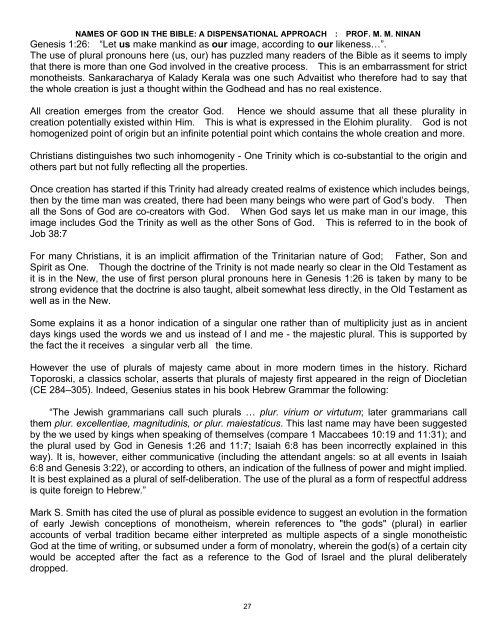THE NAMES OF GOD
Create successful ePaper yourself
Turn your PDF publications into a flip-book with our unique Google optimized e-Paper software.
<strong>NAMES</strong> <strong>OF</strong> <strong>GOD</strong> IN <strong>THE</strong> BIBLE: A DISPENSATIONAL APPROACH : PR<strong>OF</strong>. M. M. NINAN<br />
Genesis 1:26: “Let us make mankind as our image, according to our likeness…”.<br />
The use of plural pronouns here (us, our) has puzzled many readers of the Bible as it seems to imply<br />
that there is more than one God involved in the creative process. This is an embarrassment for strict<br />
monotheists. Sankaracharya of Kalady Kerala was one such Advaitist who therefore had to say that<br />
the whole creation is just a thought within the Godhead and has no real existence.<br />
All creation emerges from the creator God. Hence we should assume that all these plurality in<br />
creation potentially existed within Him. This is what is expressed in the Elohim plurality. God is not<br />
homogenized point of origin but an infinite potential point which contains the whole creation and more.<br />
Christians distinguishes two such inhomogenity - One Trinity which is co-substantial to the origin and<br />
others part but not fully reflecting all the properties.<br />
Once creation has started if this Trinity had already created realms of existence which includes beings,<br />
then by the time man was created, there had been many beings who were part of God’s body. Then<br />
all the Sons of God are co-creators with God. When God says let us make man in our image, this<br />
image includes God the Trinity as well as the other Sons of God. This is referred to in the book of<br />
Job 38:7<br />
For many Christians, it is an implicit affirmation of the Trinitarian nature of God; Father, Son and<br />
Spirit as One. Though the doctrine of the Trinity is not made nearly so clear in the Old Testament as<br />
it is in the New, the use of first person plural pronouns here in Genesis 1:26 is taken by many to be<br />
strong evidence that the doctrine is also taught, albeit somewhat less directly, in the Old Testament as<br />
well as in the New.<br />
Some explains it as a honor indication of a singular one rather than of multiplicity just as in ancient<br />
days kings used the words we and us instead of I and me - the majestic plural. This is supported by<br />
the fact the it receives a singular verb all the time.<br />
However the use of plurals of majesty came about in more modern times in the history. Richard<br />
Toporoski, a classics scholar, asserts that plurals of majesty first appeared in the reign of Diocletian<br />
(CE 284–305). Indeed, Gesenius states in his book Hebrew Grammar the following:<br />
“The Jewish grammarians call such plurals … plur. virium or virtutum; later grammarians call<br />
them plur. excellentiae, magnitudinis, or plur. maiestaticus. This last name may have been suggested<br />
by the we used by kings when speaking of themselves (compare 1 Maccabees 10:19 and 11:31); and<br />
the plural used by God in Genesis 1:26 and 11:7; Isaiah 6:8 has been incorrectly explained in this<br />
way). It is, however, either communicative (including the attendant angels: so at all events in Isaiah<br />
6:8 and Genesis 3:22), or according to others, an indication of the fullness of power and might implied.<br />
It is best explained as a plural of self-deliberation. The use of the plural as a form of respectful address<br />
is quite foreign to Hebrew.”<br />
Mark S. Smith has cited the use of plural as possible evidence to suggest an evolution in the formation<br />
of early Jewish conceptions of monotheism, wherein references to "the gods" (plural) in earlier<br />
accounts of verbal tradition became either interpreted as multiple aspects of a single monotheistic<br />
God at the time of writing, or subsumed under a form of monolatry, wherein the god(s) of a certain city<br />
would be accepted after the fact as a reference to the God of Israel and the plural deliberately<br />
dropped.<br />
27


















